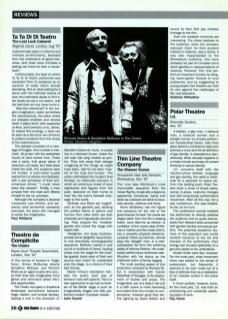Cabarets take place in informal and intimate environments, liberated from the restrictions of grand theatres. And what more intimate a setting can there be than a houseboat?
Unfortunately, the boat on which Ta Ta Di Di Teatro performed was separated from its audience by an expanse of water which proved alienating. Not an ideal setting for a piece with the intimate theme of love – the instinctive desire to find it, the rituals we use in our search, and the fear that we may never know it.
Was this intentional? In the Jungian imagination, water symbolises the subconscious, the place where our deepest anxieties and desires dwell. A place which both separates us from, and connects us to others. To extend this analogy, a boat can be seen as a structure we construct to protect ourselves from the chaos of the subconscious.
The cabaret consisted of a montage of images. One involved a mermaid, 'all at sea' with the pedestrian rituals of landlocked love. There was a party, that great place of seduction, but sadly, as it took place inside the boat, the audience were not invited. A post-coital couple leaned from a window and declared, with a sad admission of their subconscious drives: ‘I could never leave the cabaret.’ Finally, a man jumped from the boat and offered himself to the icy unknown.
Although the company's physical vocabulary was limited, and set-pieces were somewhat carelessly executed, the piece still managed to excite the imagination.

